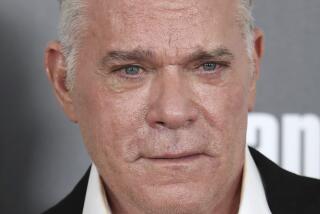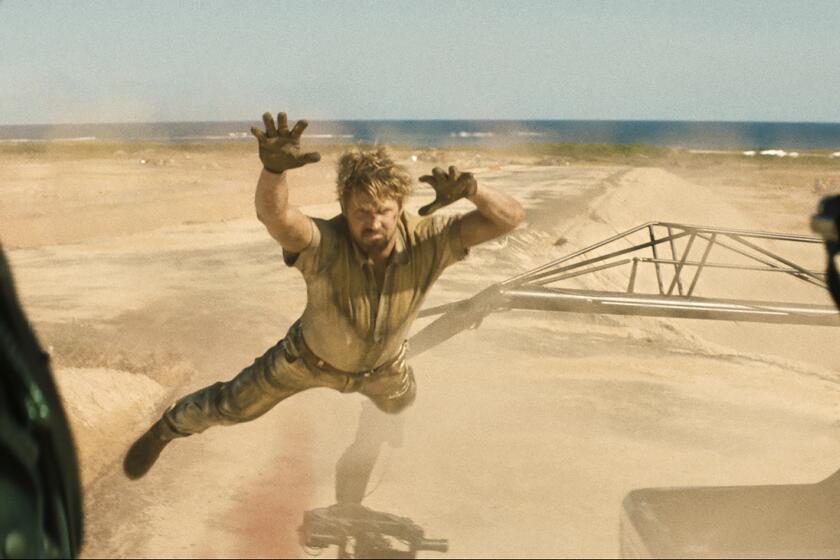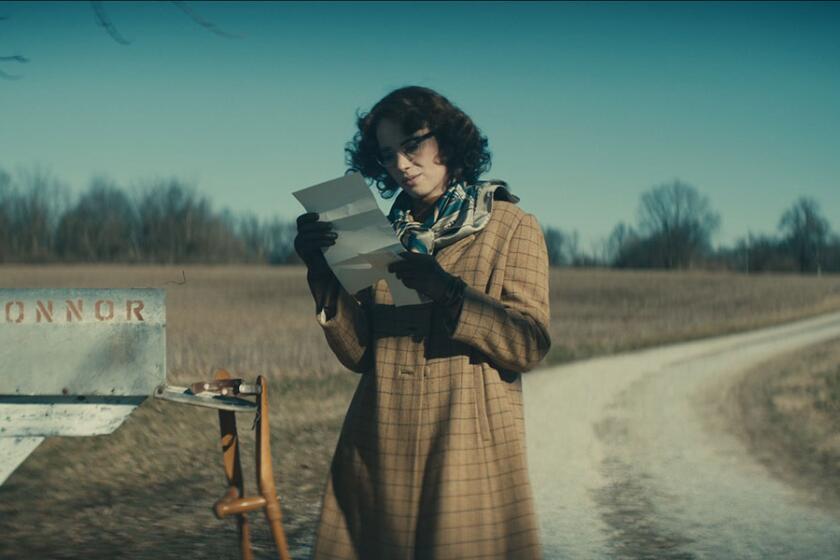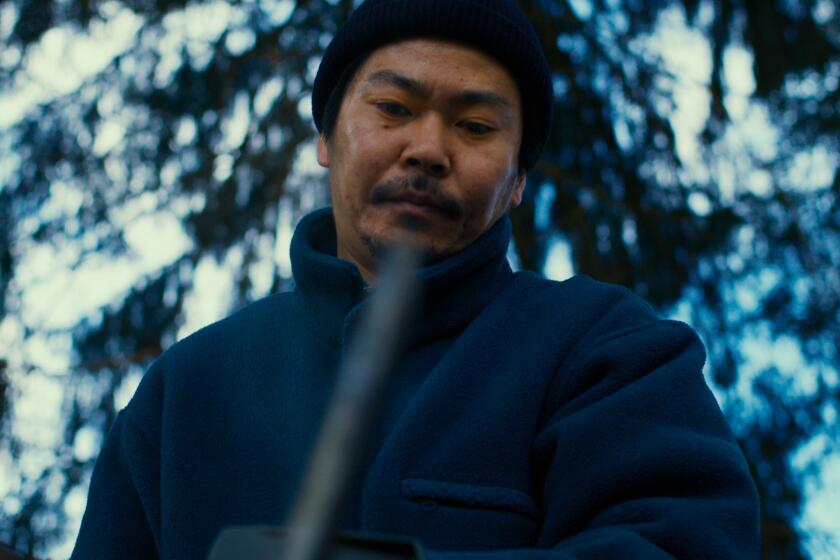Capsule movie reviews: ‘Brotherhood’ a bleak drama of neo-Nazis and sexuality
Nicolo Donato’s bleak yet compelling “Brotherhood,” an unsparing neo-noir with the structure and inevitability of classic drama, opens in the dark of night with a man entrapping a young, inexperienced gay man into a bashing and then cuts to a young blond soldier being told by his commanding officer he cannot be promoted because he’s been accused of making passes at fellow soldiers.
The soldier, Lars (Thure Lindhardt), is vulnerable when by chance he falls into a group of neo- Nazis and is recruited by its leader, the bearded, paunchy but implacably forceful Michael (Nicolas Bro).
Michael’s group of young disaffected males doesn’t take its anger out just on immigrants; the men are intensely homophobic as well. So when Lars winds up entangled in a passionate romance with Jimmy (David Dencik), Michael’s right-hand man, it’s a sure recipe for disaster.
But Donato is such an assured and involving filmmaker he generates fascination as to how Lars and Jimmy’s story will play out. The director doesn’t ask for sympathy for the two, played with brooding intensity by Lindhardt and Dencik, but rather invites the viewer to ponder “Brotherhood’s” larger implications.
—Kevin Thomas
“Brotherhood.” MPAA rating: Unrated. Running time: 1 hour, 30 minutes. At the Sunset 5, West Hollywood.
In 1983, filmmaker Tamra Davis, then working at a Los Angeles art gallery, struck up an acquaintance with artist Jean-Michel Basquiat, subsequently shooting a lengthy interview with him in 1985. She cut her footage of him, capturing a handsome, enthusiastic, articulate young man into a 20-minute film, screened at MOCA’s major Basquiat retrospective 20 years later. Davis then realized she had the nucleus of a documentary that would take years to complete, tracking down archival materials and the numerous people who knew him before his drug-related death at 27 in 1988.
“Jean-Michel Basquiat: The Radiant Child” is a remarkably rich documentary possessing depth, range, insight and compassion. Basquiat was born into an upper middle-class Brooklyn family. Although intermittently felled by psychiatric problems, his mother exposed him to great museum art an early age. By 17, Basquiat found refuge in the teeming lower Manhattan art and club scene of the early ‘80s, and was nudged from graffiti artist to a full-fledged painter who could “paint with words” by curator and art dealer Diego Cortez.
When pressures to produce for galleries and clients began mounting, he turned to heroin to maintain “focus.” Andy Warhol, his idol, took a paternal interest, steering him away from drugs, but a disastrously received collaboration between the artists, soon followed by Warhol’s death, propelled Basquiat on a downward spiral.
Through all of this Davis adroitly reveals that for all Basquiat’s soaring fame and fortune he could not break into Manhattan’s elite art circles. The Museum of Modern Art rejected his work, legendary art dealer Leo Castelli declared himself too old to deal with such a difficult artist, and powerful art critic Hilton Kramer dismissed Basquiat’s talent as so miniscule that his importance was practically nil.
—Kevin Thomas
“Jean-Michel Basquiat: The Radiant Child.” MPAA rating: Unrated. Running time: 1 hour, 30 minutes. At the Nuart, West Los Angeles, through Thursday
You don’t have to be a Silver Lake hipster or film-school student to get the references in this genre mash-up, a substanceless murder mystery set among the aspiring filmmakers and struggling musicians of northeastern Los Angeles. “The Scenesters” revels in winks about the city and the indie film biz, yet its surface-level blend of noir, vérité and “CSI” forensics is usually engaging.
Setting the tone of affectionate mockery is the faux trailer that opens the movie, a spot-on sendup of mumblecore navel gazing. The preview is for a film by Wallace Cotten, a self-serious young auteur who’s well played by writer-director Todd Berger. Through his gig as a videographer for the LAPD, Wallace crosses paths with Charlie Newton (Blaise Miller), a singer-songwriter and crime-scene cleanup technician. Charlie, whom Miller invests with a low-key spark beyond the merely relatable, catches details the self-involved police investigators miss, signs that point to a serial killer.
Wallace and his smug-without-reason producer (Jeff Grace) embark on a docu-thriller about Charlie, complete with black and white cinematography, voice-over narration and fedora, all while withholding evidence from the clueless cops. Sherilyn Fenn’s prosecutor ( John Landis cameos as the judge) interrogates the characters after the main events, guiding the story and, more to the point, prompting a number of films-within-the-film: a making-of, a music video, a training video and surveillance video. Audiences will shrug at the mystery’s solution but likely will be eager to see what Berger & Co. do next.
— Sheri Linden
“The Scenesters.” MPAA rating: Unrated. Running time: 1 hour, 41 minutes. Playing at the Downtown Independent, Los Angeles.
calendar@latimes.com
More to Read
Only good movies
Get the Indie Focus newsletter, Mark Olsen's weekly guide to the world of cinema.
You may occasionally receive promotional content from the Los Angeles Times.






